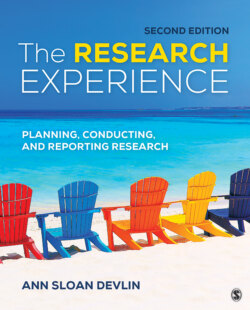Читать книгу The Research Experience - Ann Sloan Devlin - Страница 118
На сайте Литреса книга снята с продажи.
Why Conduct Correlational Research?
ОглавлениеYou might be asking yourself why people do correlational research if the goal of research is to explain behavior (hence, to determine causality). Correlational research has important purposes. First, it is sometimes used as exploratory research to see whether relationships exist before investing more resources in experimental research. Second, there are many instances in which it is not possible to manipulate variables (such as people’s hometowns). Third, it may be unethical to manipulate variables. For example, we could not tell people that a car accident had occurred to a member of their family or that they had failed a final exam to determine their emotional reaction. As Chapter 4 will explain, research on human participants is monitored by review boards to make sure ethical principles are followed.
There are innumerable situations where it is not feasible to manipulate variables. For example, we can’t change the condition of the sidewalks in people’s neighborhoods to examine the impact of sidewalk upkeep on an activity such as walking. What we would do instead is find neighborhoods (and the people in them) that are alike in as many ways as possible (e.g., health), except for the condition of the sidewalks, and then look at the differences in activity levels across neighborhoods. Again, we would also need to measure background variables such as age and car ownership that could be related to activity levels.
A fourth reason to use correlational research is to study relationships that are naturally occurring. You might assess the relationship between student test scores and involvement in extracurricular activities, without wanting to manipulate either one of those variables. Relatedly, assessing naturally occurring relationships may complement experimental studies conducted in the lab that have been described as artificial.
